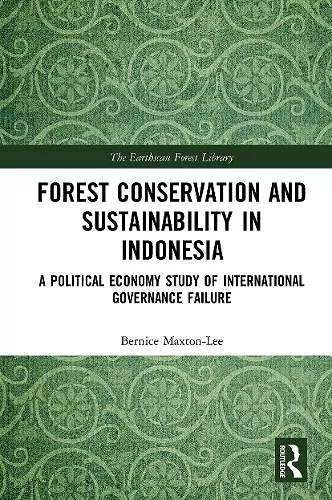Forest Conservation and Sustainability in Indonesia
A Political Economy Study of International Governance Failure
Format:Paperback
Publisher:Taylor & Francis Ltd
Published:13th Dec '21
Currently unavailable, and unfortunately no date known when it will be back
This paperback is available in another edition too:
- Hardback£145.00(9780367173463)

Despite carefully constructed conservation interventions, deforestation in Indonesia is not being stopped. This book identifies why large-scale international forest conservation has failed to reduce deforestation in Indonesia and considers why key stakeholders have not responded as expected to these conservation interventions.
The book maps the history of deforestation in Indonesia in the context of global political economy, exploring the relationship between international trade, the interests and ideology behind global sustainability programmes and the failures of forest conservation in Indonesia. Global economic and political ideologies are shown to have profoundly shaped deforestation. The author argues that the same forces continue to prevent positive outcomes. Case study chapters analyse three major international programmes: Reducing Emissions from Deforestation and Forest Degradation (REDD+), the Norway-Indonesia bilateral partnership, and the Roundtable on Sustainable Palm Oil (RSPO) in Indonesia. The findings provide insight into the failures of global climate change policy and suggest how the book’s theoretical model can be used to analyse other complex environmental problems.
The book is a useful reference for students of environmental science and policy, political theory, international relations, development and economics. It will also be of interest to forestry professionals and practitioners working in NGOs.
"This book by a committed environmentalist has tough messages for the Western conservation movement. In eight key findings, Bernice Maxton-Lee underlines blunt facts that activists in rich countries must face. Too many of the ideas advanced as solutions to the challenge of climate change are sideshows. Environmentalists in rich countries should blaming developing countries like Indonesia for global problems. The most important reforms need to start within the global North." — Peter McCawley, Honorary Associate Professor, Indonesia Project, Arndt-Corden Dept of Economics, College of Asia and the Pacific, ANU, Canberra
"Social scientists will be failing humanity if they fail to dig deep into who "you" are in Greta Thunberg’s lion’s roar, and why they "dare". By deconstructing the deadly structural traps of the global economy and decoding the neoliberal framing, this book explains how climate change was used as a great opportunity for those in the position of power to further entrench and intensify the unjust relationship among the Global North, the Global South, and nature. It unravels the zealous participation - oftentimes with pride and conviction - of consequent climate-change victims in speeding up the destruction of nature under banners such as "sustainable development" and "conservation" while staying clear of meaningful and ground-shifting actions for climate mitigation. Taking a historical long view and backed by rich empirical evidence, the book offers insights critical to the dethronement of neoliberalism." — Chien-Yi Lu, Associate Research Fellow, Institute of European and American Studies, Academia Sinica Taipei, Taiwan R.O.C.
"This remarkable book deconstructs the myth of responsible consumption of agricultural commodities and conveys the ultimate inconvenient truth: An ecologically sustainable economic growth is as impossible as the perpetuum mobile. The analysis is straightforward and outspoken. We urgently need much more of this kind of conservation literature, which is radical in the best sense of the word. Conservationists who think voluntary standard-setting certification through and down to the roots will eventually recognize that ‘it is designed to ensure the path of least resistance for capital to increase its own production‘. Current approaches to sustainability certification comfortably accompany the sleepwalking consumption society into disaster." — Pierre L. Ibisch, Professor for Nature Conservation, Research professorship for "Ecosystem-based sustainable development", Centre for Econics and Ecosystem Management, Faculty of Forest and Environment, Eberswalde University for Sustainable Development, Germany
"Do you avoid palm oil in your biscuits? Sign petitions to protect orangutans? So do I - and this book is for us. Carefully referenced, it traces the tricks of neoliberal "common sense" that convince us to trust REDD schemes, palm oil certification, or imaginary "zero deforestation." For all who care about the burning forests, Maxton-Lee gives us the cold water treatment. The growth economy is the real villain. Its continued pressure to increase demand for goods and services is what is leading to ecological destruction. Individual gestures will not suffice." — Kerryn Higgs, University Associate, University of Tasmania; Associate Member, Club of Rome
"Bernice Maxton-Lee presents an unvarnished analysis why conservation and sustainable development efforts have failed to protect Indonesia’s forests. Indonesia’s remaining tropical forests, which harbour some of the richest biodiversity in the world, are now also increasingly victims of climate change. Deforestation and carbon emissions continue rising, despite all assurances and international efforts. This important book is based on a critical political analysis that reveals the disastrous subordination to the Western neoliberal economic growth paradigm." — Claude Martin, Former Director General of WWF International and author of "On the Edge – The State and Fate of the World’s Tropical Rainforests"
ISBN: 9781032237626
Dimensions: unknown
Weight: 326g
226 pages